
Form No 62047 – 11/20 Infrared Dynamics, Inc © Copyright 2020 Printed in USA
Sunpak Models S25 & S34
Outdoor Gas Infrared Patio Heater
NOT FOR USE IN RESIDENTIAL DWELLINGS
Installation, Operation and & Maintenance Instructions
Installer: Please take the time to read and understand these instructions prior to installation. Installer
must provide a copy of this manual to the owner.
Owner: Keep this manual in a safe place in order to provide your service technician with the
necessary information.
Warning: These instructions are intended for qualified personnel, specifically trained and experienced in the
installation and repair of this type of equipment and related system components.
WARNING: California
Proposition 65
WARNING
IF NOT INSTALLED, OPERATED AND MAINTAINED IN
ACCORDANCE WITH THE MANUFACTURER’S
INSTRUCTIONS, THIS PRODUCT CAN EXPOSE YOU TO
SUBSTANCES IN THE FUEL OR FROM COMBUSTION
INCLUDING CARBON MONOXIDE, RESULTING IN DEATH OR
SERIOUS ILLNESS AND WHICH ARE KNOWN TO THE
STATE OF CALIFORNIA TO CAUSE CANCER, BIRTH
DEFECTS OR REPRODUCTIVE HARM. For more information
go to www.P65WARNINGS.CA.GOV
Improper installation, adjustment, alteration,
service or maintenance can cause death,
injury or property damage. Read and
understand the installation, operating and
maintenance instructions thoroughly before
installing or servicing this heater.
Infrared Dynamics, Inc
3830 Prospect Avenue
Yorba Linda, CA 92886
http:\\sunpak.us
For Local Distributor Listing
Call Us Toll Free (888) 317-5255

Sunpak® S25 & S34 Infrared Heaters
2
Table of Contents
1. Warnings
2. Basic Operation
3. Heater Layout and Design
4. Installation / Service
5. Replacement Parts
6. Trouble Shooting Guide
7. Warranty
Sunpak heaters work like the sun
projecting radiant heat down to warm
your patio and guests. This heater was
designed for outdoor installation;
however, breezes will affect the heating
efficiency, and severe weather
conditions will cause the safety system
to shut down the heater. For your
safety, you must read and understand
the following warnings before
continuing.
WARNING
WARNING
Not for use in residential dwellings.
A residential dwelling is a domicile intended
for use by one or more persons and that
includes one or more areas, such as those
used for cooking, eating, living, sleeping or a
sanitary facility. A residential dwelling does
not include an attached and detached
garage, workshop or outdoors. Installation
in residential indoor spaces may result in
death, asphyxiation, serious injury, or
property damage.
Storage of gasoline and other flammable
vapors and liquids in the vicinity of this or
any other appliance may result in fire or
explosion. DO NOT store or use gasoline
or other flammable vapors and liquids in
the vicinity of this or any other appliance.
Always maintain clearance to
combustibles as specified.
High Altitude
Installations
For Your Safety
If you smell gas:
• Shut off gas to the appliance
• Extinguish any open flame
• DO NOT touch any electrical
switch
• Call your gas supplier. DO NOT
use any phone in your building.
• Follow the gas supplier’s
instructions.
• If you cannot reach your gas
supplier call the fire department
Installation of this appliance at altitudes
above 2,000 Ft (610 m) shall be in
accordance with local codes, or in the
absence of local codes, the National Fuel
Gas Code, ANSI Z223.1/NFPA 54 or the
National Standard of Canada, Natural
Propane Installation Code, CSA B149.1

Sunpak® S25 & S34 Infrared Heaters
3
Basic Heater Operation
Sunpak® Heaters
Sunpak Heaters are available with two different input rates.
The Model S25, rated at 25,000 Btu/Hr, allows people to be
comfortable at lower mounting heights. The model S34,
rated 34,000 Btu/Hr, requires greater clearance from
combustible material, and it is comfortable at greater
mounting heights (see page 4).
Both heaters require 24 VAC from a transformer that must
be located outside of the heater. The control system is a
simple on/off control with can be actuated with either a
switch or a timer (supplied by installer). The electronic
ignition and flame sensing require continuous power while
the heater is operating.
NOTE: Sunpak Heater shown with optional Face Trim
A 24 VAC Transformer with a minimum rating of 20 VA is required for
each heater. Transformer should be class 2 with CSA or UL listing.
Sunpak® heaters utilize a spark ignition and electronic
flame safety control. The pilot is only ON while the heater
is operating. If the flame safety sensor fails to sense
flame at the pilot, the heater will shut down and lockout.
This may happen due to low gas pressure or a gusty wind.
To restart the heater, first set the switch to OFF before
turning the heater ON.
Although these heaters are designed for outdoor
installation and use, it is important that switches,
transformers or other operating controls be protected
from the weather.
Ventilation
Heaters are not for use in residential dwellings. Heaters
used in an enclosed area require the bulding to have the
necessary ventilation. It is required that areas above the
heater be properly vented to allow for necessasry
combustion air and removal of comubustion gases.
See page 9 for additional detials.
Definition of outdoors
1. Walls on all sides, but no overhead cover.
2. A partial enclosure which includes an overhead
cover, but no more than two side walls. These side
walls may be parallel, as in a breezeway, or at right
angles to each other.
3. A partial enclosed which includes an overhead
cover and three side walls as long as 30% of the
horizontal periphery is permanently open.

Sunpak® S25 & S34 Infrared Heaters
4
Heater Layout and Design
Sunpak® heaters were specifically designed to provide
heated comfort in an outdoor environment. They have been
used on outdoor patios across the United States and
Canada for over 40 years. When properly integrated into a
patio design, Sunpak® heaters generally increase the
comfort level 5º to 10º Fahrenheit outdoors. The heating
effectiveness will depend on air temperature, wind velocity
and other factors. Whenever possible other local Sunpak®
installations should be reviewed to determine the
effectiveness for regional environment.
The environments in which Sunpak® heaters are utilized
vary greatly. As an outdoor rated heater, it has passed basic
wind and rain tests. This does not mean the heater cannot
be damaged by the environment or when operated in very
windy conditions. For this reason, it is strongly suggested
that heaters be inspected and if necessary repaired annually
or before each heating season.
The variable environments in which Sunpak® heaters are
applied means that these general guidelines are generated
by necessity and may need to be refined for local conditions.
These guidelines are to be used in combination with the
installation instructions.
Patio Design Consideration
Heater placement is critical for effective and efficient
patio heating. If heaters are placed too close together or
mounted too low, people become uncomfortable. If
heaters are placed too far apart on a breezy, wind-swept
patio the patio may never get warm.
Sunpak® heaters work best if they are placed in areas
of the greatest heat loss, such as the open side of a semi-
protected patio area. The Sunpak® heater may be
mounted at up to a 30-degree angle or face down. Note
that the top clearances required from combustible material
increases when heaters are at an angle. The heater must
always be horizontal to the floor. Never mount the heater
in the vertical position.
Breezy conditions must be considered when heating
any patio. Windbreaks can be extremely effective in
increasing comfort and reducing heating costs.
Windbreaks must be designed in such a way as to allow
the necessary fresh air and ventilation for proper heater
operation (see ventilation of installation section).
Sunpak® heaters must always be operated in a location
that allows uniform air pressure around the heater. If only
part of the heater is located in a wind protected zone
damage to the heater may occur. Time should be taken to
observe how the wind will affect the heaters under local
conditions.
MINIMUM CLEARANCE FROM COMBUSTIBLE MUST BE MAINTAINED (see chart on page 6 & 7)
SUNPAK will raise the comfort level 5-10º Fahrenheit outdoors.
The above coverage table was based on still breeze conditions.
Under windy conditions more heat will be required. It is
recommended that a windswept patio be designed with wind
breaks to stabilize the patio environment. Wind breaks shall NOT
interfere with the ventilation or combustion air requirements of the
heater(s) and meet clearance for combustible requirements listing
on page 6 & 7.
WARNING: Severe updrafts such as you might get on a raised
terrace or roof top patio can cause damage to the heater.
ANGLE MOUNTING: Most applications of the
SUNPAK® heater may be angle-mounted to a
maximum of 30º to accommodate mounting the
heaters around the edges of the patio. Note that the
top clearance to combustibles increases when
heater is tipped from the horizontal.
NOTE: Local codes may have special requirements
regarding head clearance requirements. Some local
codes require all portions of overhead radiant
heaters to be located at least 8 feet above the floor.

Sunpak® S25 & S34 Infrared Heaters
5

Sunpak® S25 & S34 Infrared Heaters
6
Warning: Heater must be level in the lengthwise direction.

Sunpak® S25 & S34 Infrared Heaters
7
Installation/Service Instructions
Receiving Equipment
On receipt of equipment it is suggested that a visual
inspection be made for external damage to the carton. If
the carton is damaged, a note should be made on the Bill
of Lading when signing for the equipment. Remove the
heater from the carton. If there is damage, report the
damage to the carrier immediately.
INSTALLATION INSTRUCTIONS
Important Notice
These instructions are intended for qualified personnel,
specifically trained and experienced in the installation of
this type of equipment and related system components.
Some states or provinces require installation and service
personnel to be licensed. If your state or province is
such, be sure your contractor bears the appropriate
license. Persons not qualified shall not attempt to fix this
equipment nor attempt repairs.
WARNING
Asphyxia, Explosion or Fire
Improper installation, adjustment,
alteration, service or maintenance may
create a hazard resulting in asphyxiation,
explosion or fire, or damage to the
equipment.
Code Requirements
Installation must be in accordance with local codes, or in
the absence of local codes, with the latest edition of the
National Fuel Gas Code, ANSI Z224 and National
Electrical Code ANSI/NFPA 70, and for Canada, the
latest edition of CAN/CGA-B149.1 and B149.2 and
Canadian Electrical Code, CSA C22.1 Part 1 and Part 2.
• Heaters to be installed in Aircraft hangars must be
installed in accordance with American National
Standards for Aircraft Hangars, ANSI/NFPA
No. 409.
• Heaters to be installed in Public Garages must be
installed in accordance with NFPA No. 88A,
Standards for Parking Structures.
• Heaters must be installed so that minimum
clearances marked on the heaters will be
maintained from vehicles parked below the heater.
• Each heater must be electrically grounded in
accordance with the National Electrical Code,
ANSI/NFPA 70, when an external electrical source
is utilized. In Canada, the CSA Canadian Electrical
Code, C22.1 Part 1 applies.
Gas Supply
The gas inlet supply pressure and manifold pressures required
for each heater are listed below. For gas supply line pressures in
excess of ½ PSI, consult with your gas service provider or the
factory.
Gas Inlet Pressure
Nat Gas
Propane
Maximum Pressure
½ PSI
½ PSI
Minimum Pressure
6” W.C.
11” W.C.
Manifold Pressure
5” W.C.
10” W.C.
It is critical that the gas piping system be adequately sized for all
the gas appliances it serves.
Clearances
Each heater must be installed such that the following
“Minimum Clearance to Combustible Materials’ are maintained.
Combustible materials include wood, compressed paper, plant
fibers, plastic, Plexiglas® or other materials capable of being
ignited and burned. Such materials shall be considered
combustible even though flame-proofed, fire retardant treated
or plastered. Additional clearance may be required for glass,
painted surfaces, vinyl siding or other materials which may be
damaged by radiant or convection heat.
Adequate space around each heater is required even when the
materials surrounding the heater are non- combustible to
provide adequate combustion air and ventilation of exhaust
gases. Heaters should never be located in a ceiling recess or
soffit.
The stated clearance to combustible materials represents a
surface temperature of 90ºF (32ºC) above room temperature.
Building materials with a low heat tolerance (such as plastic,
vinyl siding, canvas, tri-ply, etc.) may be subject to degradation
at lower temperatures. It is the installer’s responsibility to assure
that adjacent materials are not subject to degradation.
In locations used for storage of combustible materials, signs
shall be posted to specify the maximum permissible stacking
height to maintain required clearances from the heater to
combustible materials.
OPTIONAL MOUNTING KIT (#12006): Optional Mounting Kit is
included in some packages. Whether the mounting kit is used or
not, minimum clearance from combustibles must be observed as
follows:
WARNING: The clearances shown below are also applicable to
vehicles parked below heaters.
Input
Side
Rear
Ceiling
Below
Mtg.
Model
BTUH
In
In
In
In
Angle
S25
25,000
24”
12”
9”
48”
HORIZ
S34
25,000
24”
17”
13”
48”
HORIZ
S25*
34,000
24”
8”
14”
48”
30º MAX
S34
34,000
24”
8”
18”
48”
30º MAX
Above clearances apply to Natural and Propane.
*Model S25 for propane gas for use in horizontal position only.

Sunpak® S25 & S34 Infrared Heaters
8
WARNING
Suspension Hazard
Mounting kits and hanging supports must
be able to withstand a minimum working
load of 75 lbs. (33 kg). Failure of the
supports can result in death.
Local codes regarding head clearance
requirement must be observed.
Heater Mounting and Support
Heaters shall be mounted in a fixed position independent
of gas and electrical supply line. Hangers and brackets
shall be of noncombustible material.
Heaters subject to vibration shall be provided with
vibration isolating hangers.
Suitable materials for hanging infrared heaters are steel
pipe, steel channel, or fabricated hangers of at least 16-
gage material. Hanger and brackets must be secured with
adequate anchor to a secure structure using good
building practices. Additional bracing to protect against
seismic forces may be required in seismically active
areas. Never mount heaters to a moving object such as a
trailer, motor home, boat, etc.
Gas Piping
1. A minimum pipe size of ½” is required for inlet piping. A
½” lever handled gas shut-off valve should be installed
within 6 feet of the appliance for servicing and as
emergency shutoff to the unit.
2. Check with local and state plumbing and heating codes
regarding sizing of gas lines.
3. All gas pipe connections to the heater(s) must be sealed
with a gas pipe compound resistant to liquefied
petroleum gases.
4. Installation of a drip leg or sediment trap in the gas
supply line going to each heater is required to minimize
the possibility of any loose scale or dirt within the gas
supply line from entering the heater’s control system.
5. When checking for gas leaks, do not use an open flame.
Use a soap and water solution.
6. For gas supply line pressures in excess of ½ PSI,
consult the factory or your local representative.
7. Installation of 1/8” N.P.T. plugged tap accessible for test
gage connections is required upstream of the gas
supply connections to the heater.
8. Never use pipe sealing compound on brass to brass
flared fittings.
Electrical
1. Sunpak® Heaters (except TSR models) require a 24 VAC
NEC Class 2 transformer. Each heater requires
approximately 20VA or .08 amps. When multiple heaters
are connected to one transformer, the transformer must
be sized to accommodate the entire load. The
transformer must never be located inside the heater.
2. Use at 18GA wire up to 50 feet from the heater. Use a
minimum of 16GA wire for over 50 feet distance.
3. If any of the original wire supplied inside the appliance
must be replaced, it must be replaced with wiring material
having a temperature rating of at least 105 degrees
Centigrade.

Sunpak® S25 & S34 Infrared Heaters
9
Ventilation
1. It is required that areas above the heater be
properly vented to allow for necessary
combustion air and removal of combustion gases.
2. Heaters shall be provided with natural or
mechanical means to supply and exhaust at least
4 cfm per 1,000 BTU per hour of heater input.
Exhaust openings for removing the flue products
shall be above the level of the heaters.
3. Heater ventilation must comply with state and
local codes. Never use heater in a fully
enclosed area.
Fire Sprinklers
Fire Sprinklers must be located at an appropriate
distance from each heater to avoid accidental activation
of the sprinkler. Ethylene glycol or propylene glycol must
never be used in fire sprinkler systems where heaters are
present as these substances may become flammable
when heated. A fire sprinkler professional must be
consulted when heaters are installed where fire sprinklers
are present to insure that heaters and the fire sprinkler
system are properly integrated. Specific guidelines can be
found in NFPA 13 regarding design and specifications for
Fire Sprinkler Systems near heaters.
Initial Start-Up Procedure
(Read entire Procedure First)
1. Before turning ON your new heater make sure:
a. Heater is securely mounted and clearances from
combustible materials have been observed (see
Clearances – page 7);
b. Tip angle of heater does not exceed 30 degrees
(see Correct Mounting – page 12);
c. Gas line is properly connected and there are no
leaks (see Gas Piping – page 8);
d. Make sure 24 VAC is properly connected to the
heater. Applying 120 VAC to the heater will
damage the switch and other heater controls
2. Start Heater;
a. Turn ON manual gas valve.
b. Set switch to the high setting for the first 5
minutes.
c. If heater locks out, switch to OFF to RESET
Heater and repeat start up sequence.
d. If the heater locks out several times there may
still be air in the gas line.
NOTE: Some white smoke may appear
during or just after the initial start-up of the
heater. White smoke will dissipate with
proceeding use. This is normal due to
some residual lubrication on a new heater
Regular Service and Maintenance
Over time, particularly during long periods of non-use,
the heater can accumulate dirt and debris in and
around the pilot and the burner. Routine maintenance
should be performed at least once a year by a qualified
service agency to insure the heater is operating
properly. More frequent service may be required for
heaters located near waterfronts. If local service is not
available call your natural gas or propane supplier.
Sunpak Pilot and Electrode Position.
________________________________________

Sunpak® S25 & S34 Infrared Heaters
10
Optional Face Trim can be easily installed on all Sunpak models
You must remove the Sunpak Face Trim to connect power to the heater. The Sunpak Face Trim is secured with
four (4) screws, two (2) located along each side of the heater.

Sunpak® S25 & S34 Infrared Heaters
11

Sunpak® S25 & S34 Infrared Heaters
12

Sunpak® S25 & S34 Infrared Heaters
13

Sunpak® S25 & S34 Infrared Heaters
14
Basic S25 & S34 Trouble Shooting
Problem Possible Causes How to Fix References
No Spark to pilot
No power from transformer
• Replace Transformer
No power to the heater • Switch is On
•
Verify wiring is properly connected to the heater module
Electrical – Page 8
Basic Wiring – Page 10
Sparks, but does
not ignite burner No Gas to Heater
• Allow time for air to bleed from gas line on new installations
• Turn on manual gas valve
• Clean burner orifice
Gas Piping – Page 8
Regular Service & Maintenance – Page 9
Heater lights, but
turns off
Low Voltage
• Make sure you have 24 VAC to heater
Loose or broken ground wire
inside control compartment • Secure ground wire to heater body Control System – Page 11
Pilot Electrode
• Adjust pilot electrodes 3/16 from pilot hood.
• Replace Control Module
• Replace Pilot-Electrode Assembly
Sunpak Pilot – Page 9
Control Components – Page 11
Not Enough Heat Low Gas Pressure • Verify required gas pressure to heater
Gas Supply – Page 7
Gas Piping – Page 8
Lack of Fresh Air to Heater
• Adjust tip angle to less than 30 degrees
• Add ventilation to patio above and below heater
Ventilation – Page 9
Dirty Orifice
• Clean orifice
Regular Service & Maintenance – Page 9.
Dirty Burner
• Use bottle brush to clear any cobwebs or debris from mixer tube of burner.
• Use compressed air (under 30 psi) to blow through ceramic (eye protection
required)
Poor Heater Coverage • Review Heater Layout and Design Heater Layout & Design – Page 4
Deterioration of
Front Grill
Tip Angle over 30 degrees • Adjust Tip Angle to less than 30 Degrees Incorrect Mounting – Page 13
Wind hitting heater from below
• Set up wind break to prevent strong breeze from hitting infrared burner face
directly. Any wind break must not interfere with the safe operation of the
heater.
• Heater must always be operated in an equal pressure environment
Heater Layout & Design – Page 4
Burner Noise Dirty Orifice •
Clean orifice thoroughly or replace if necessary
Regular Service & Maintenance – Page 9
Dirty Burner
• Use bottle brush to clean mixer tube of burner
• Use compressed air to clean ceramic burner ports (max 30 PSI) - eye
protection required.
Cracked Ceramics
• Replace infrared burner

Sunpak® S25 & S34 Infrared Heaters
15
Limited Warranty
THIS WARRANTY IS APPLICABLE TO THE ORIGINAL OWNER ONLY, in accordance with the
warranty terms and conditions specified below.
Infrared Dynamics (the warrantor) will furnish at our option the ORIGINAL OWNER, 1) a
replacement Infrared Dynamics’ heater or 2) a replacement part for any component part which
fails before one year when for residential use. When the heater has been used for other than
single family residential applications, the warranty shall be 90 days.
Service and Labor Responsibility
UNDER THIS LIMITED WARRANTY, THE WARRANTOR WILL PROVIDE ONLY A
REPLACEMENT HEATER OR PART THEREOF. THE OWNER IS RESPONSIBLE FOR ALL
OTHER COSTS. Such costs may include, but are not limited to:
a. Labor charges for service, removal, or reinstallation of the heater or part thereof.
b. Shipping and delivery charges for forwarding the new heater or replacement part from
the nearest distributor and returning the claimed defective heater or part to such
distributor.
c. All costs necessary or incidental for handling and administrative charges and for any
materials and/or permits required for installation of the replacement heater or part.
LIMITATION ON IMPLIED WARRANTIES
Implied warranties, including any warranty of merchantability imposed on the sale of this heater
under state law are limited to one year duration for the heater or any of its parts. Some states do
not allow limitations on how long an implied warranty lasts, so the above limitations may not
apply to you.
CLAIMS PROCEDURE
Any claim under this warranty should be initiated with the distributor, dealer, or seller who sold
the heater, or with any other dealer handling the warrantor’s products. If this is not practical, the
owner should contact: Infrared Dynamics, 3830 Prospect Avenue, Yorba Linda, California 92886.
Phone 1-888-317-5255 or visit our website: www.infradyne.com.
-
 1
1
-
 2
2
-
 3
3
-
 4
4
-
 5
5
-
 6
6
-
 7
7
-
 8
8
-
 9
9
-
 10
10
-
 11
11
-
 12
12
-
 13
13
-
 14
14
-
 15
15
SUNPAK S25 S Owner's manual
- Type
- Owner's manual
Ask a question and I''ll find the answer in the document
Finding information in a document is now easier with AI
Related papers
Other documents
-
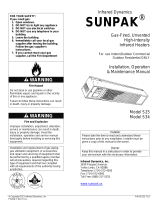 AEI Corporation S25SST Installation guide
AEI Corporation S25SST Installation guide
-
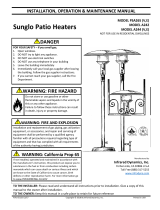 Sunglo PSA265V S/S Owner's manual
Sunglo PSA265V S/S Owner's manual
-
SunStar N7 SGL1560 Owner's manual
-
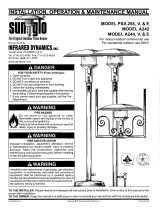 Sunglo PSA 265 Installation, Operation & Maintanance Manual
Sunglo PSA 265 Installation, Operation & Maintanance Manual
-
Twin Eagles TEGH48-B Owner's manual
-
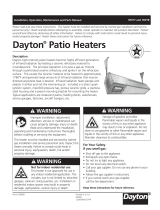 Detroit Radiant Products 1RVT7 User manual
Detroit Radiant Products 1RVT7 User manual
-
Twin Eagles TEGH-48 Owner's manual
-
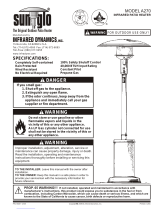 Sunglo A270 Installation, Operation And Maintenance Instructions
Sunglo A270 Installation, Operation And Maintenance Instructions
-
Space-Ray WIND BLOCKER WB35-N7 Installation And Operation Instructions Manual
-
Schwank 2300 Series Installation & Owner's Manual



























